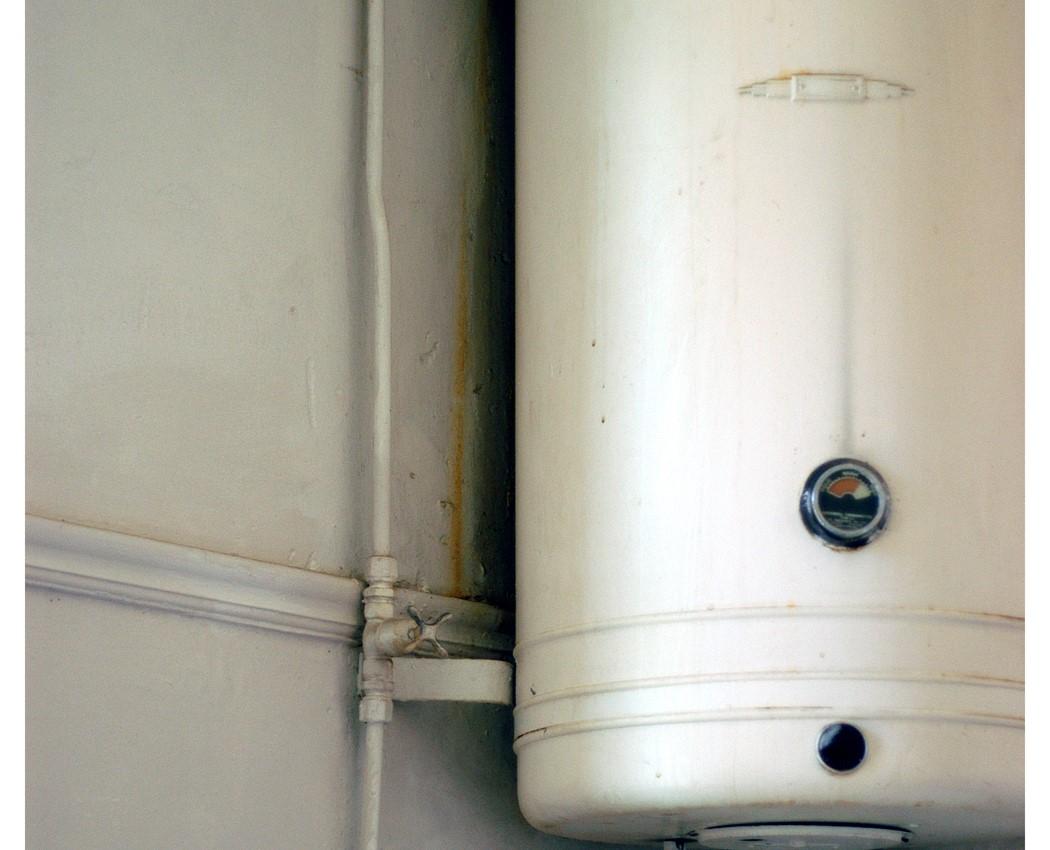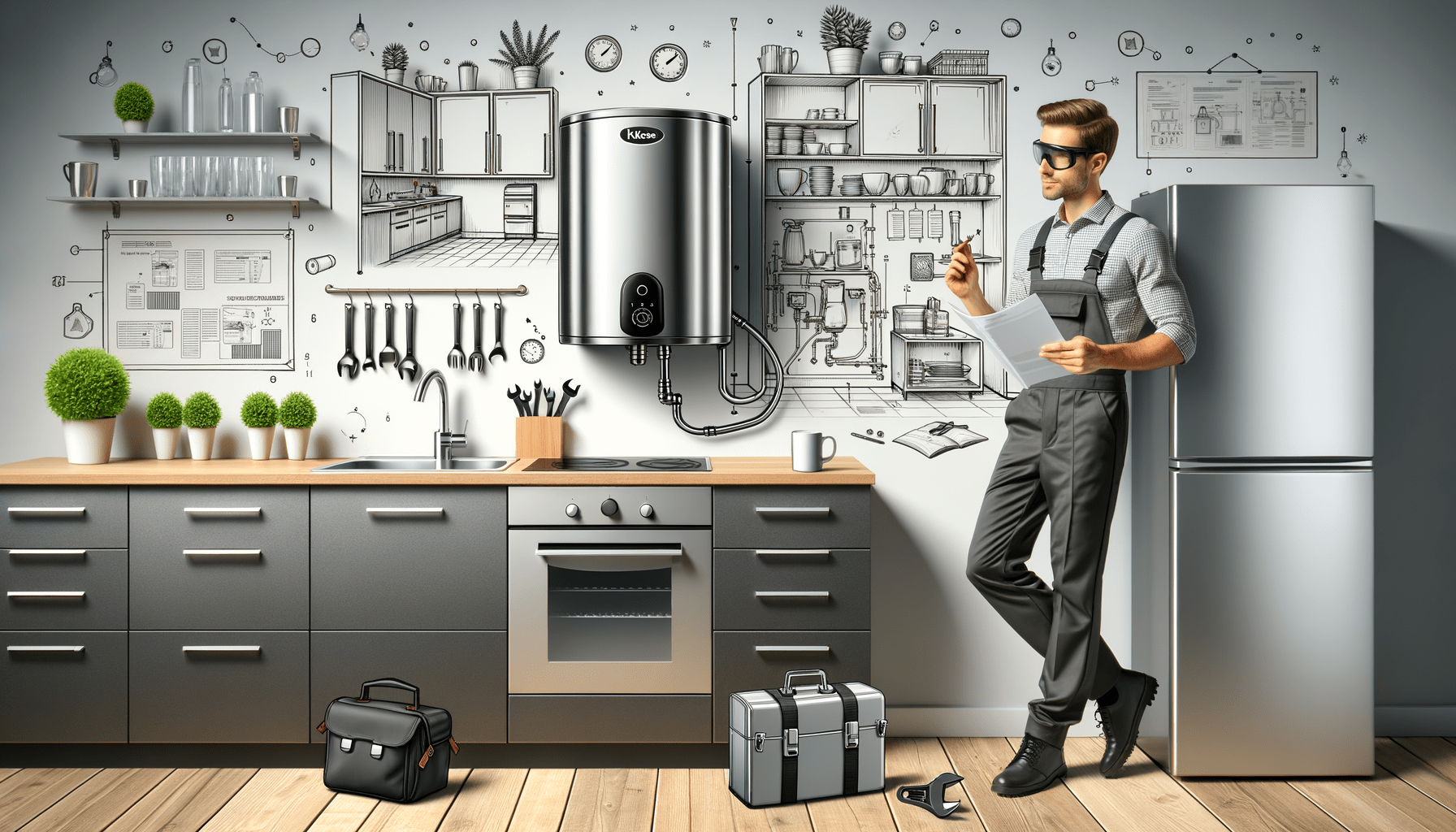A sudden pool of water around your home’s storage tank or inconsistent water temperature are clear indications of a leaking hot water service. Understanding the right course of action is crucial not only for your comfort but also to avoid incurring expensive repair costs. With a little insight and guidance, it’s possible to accurately diagnose the issue, perhaps even fix minor leaks yourself, or wisely decide if it’s time for an expert plumber to step in and replace your entire system.
Contents
- Identifying Your Leaking Heater
- Disabling Electrical Connections Safely
- Halting Cold Water Flow
- Locating The Water Leak
- Addressing Water Heater Spillage
- Preventing Future Heater Leaks
- Key Causes of Heater Leakage
- Dealing with Top Heater Leaks
- Water Heater Replacement versus Repair
- Maintaining Your Water Heater
- Recognising Plumbing Emergencies
- Proactively Avoiding Heater Leaks
- A Quick Wrap-up
- Frequently Asked Questions (FAQ)
Identifying Your Leaking Heater
The first thing you need to do is collect all the signs pointing towards your heater’s condition. Pay attention to any puddles near the system, inconsistent water temperature, or the occurrence of unusual sounds.
You might also notice rust-coloured water coming out of taps at times. Remember that determining whether the leakage is from the heater or an associated pipe can save you a lot of headache later.
Disabling Electrical Connections Safely
Working on anything related to electricity and water requires adequate safety precautions. Start by switching off the power source connected to your hot water system. This might involve powering off your entire property if there isn’t a dedicated circuit breaker for your heater.
It might be tempting to ignore the electric hazards while diagnosing the issue, but keep in mind that safety precedes all else. Electrical heating components can be dangerous if neglected during the process.
Whether you feel confident about this step yourself or need professional help depends on your comfort level dealing with electricity. However, in most cases, a trained plumber is recommended.
Halting Cold Water Flow
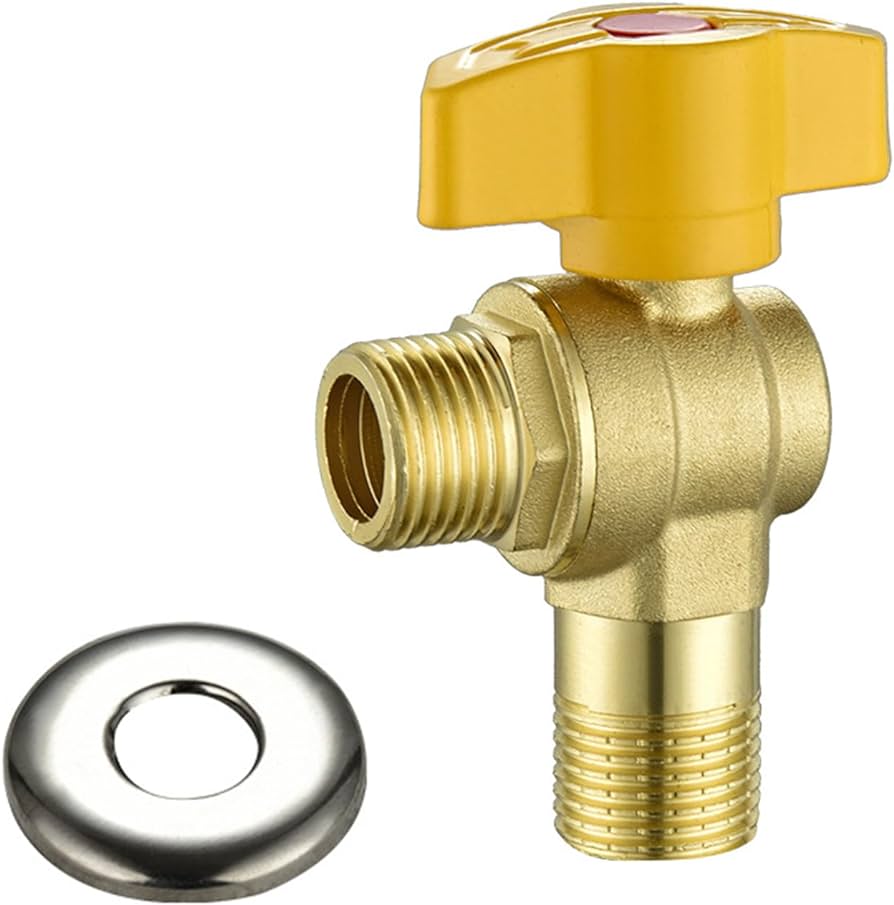
The next step is to stop cold water from entering your heater to mitigate the leak. You will find a cold water shut-off valve above your heater. Turn it clockwise till it’s in a completely closed position.
This might seem like a relatively simple step but keep in mind not to apply excessive pressure as it can lead to more damage and escalate the situation further.
Even after halting the cold water input, it’s crucial to monitor the situation closely for an hour or so. The absence of any new leakage points towards a leaking weight-relieving safety valve, whereas continuous spilling indicates tank rupture.
Locating The Water Leak
A common point of leakage is around the pressure relief valve that ensures your tank doesn’t build up excessive pressure. Often, dirt particles can prevent its proper closure creating a persistent dribble.
The tank itself can be another culprit. Years of heating water can cause corrosion and rusting at the base leading to small leakages. Keep in mind that tanks have an average lifespan of 10-15 years, so if yours is around this age, you might need a replacement.
Addressing Water Heater Spillage
If you identify a definite leak from your water heater, it’s time to address the spillage. Acting quickly will prevent any potential water damage to surrounding structures and belongings.
A reliable method is using old towels or mop to absorb water initially. If the leak is widespread, considering renting a wet vacuum can be beneficial. In extreme cases where the leak has resulted in substantial flooding, you might need to hire professionals who specialize in water damage clean-up.
Preventing Future Heater Leaks
Maintaining a sound upkeep routine prevents problems from sprouting up unexpectedly. The inclusion of professional service check-ups from reputed bodies like the Plumbing Network can ensure your heater’s longevity.
The anode rod inside your heater is one component that you should replace every 4-5 years. It attracts all corrosive elements present in your water, protecting the tank from rusting and leakage.
Also, remember to have your tank flushed at least once a year. This helps clear built-up sediment at the bottom of your tank, allowing efficient heating and preventing unexpected leaks.
Key Causes of Heater Leakage
One common cause for heater leakage is corrosion from years of heating water. Apart from prolonging your heater’s life by replacing the anode rod regularly as mentioned earlier, considering upgrading to tanks made up of rust-resistant materials can also be an effective preventive measure.
Sometimes, high pressure builds up within your water heater, causing the temperature and pressure relief valve to leak. Adjusting your heater’s temperature to an optimal level can alleviate this problem in many instances.
A leaking drain valve or loosened connections can also lead to slow but steady water leaks. It’s crucial to ensure that all connections are tight and secure during routine maintenance checks by reliable organizations such as the Master Plumbers’ Association.
Dealing with Top Heater Leaks
Ah, a leaking hot water service. Not the most thrilling sight, is it, mate? Now before you go full DIY hero to save the day, let’s talk about what you’re facing.
Your heater could be leaking due to something as simple as a broken valve or pipe connection—certainly an issue but not necessarily apocalyptic. Simply turning off your power supply and tightening the loose connections or replacing a faulty valve might just do the trick. Water heating, while being a foundational aspect of building engineering, definitely has its quirks, but don’t let them spook you!
However, keep in mind that safety is paramount. If you spot any leaks near electrical appliances, immediately turn off your circuit breaker to avoid any dangerous situations.
If your heater continues leaking despite these steps, maybe corrosion took a bite out of your tank. Corrosion can occur due to the chemical reactions between water and certain mechanical elements in your heater.
Water Heater Replacement versus Repair
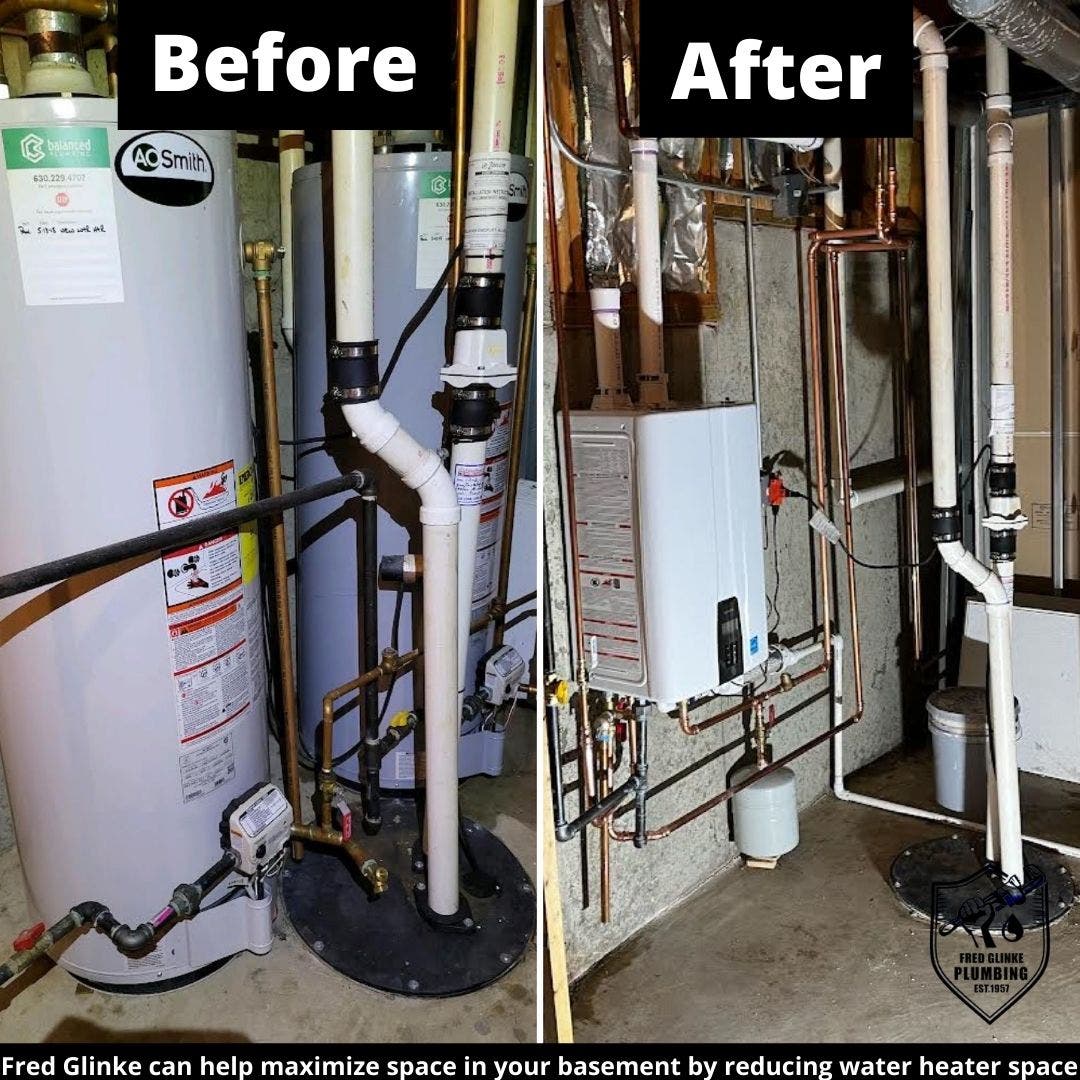
Based on our mates over at IBHS, 75% of water heaters fail before they reach 12 years old – pretty sobering fact right there. Energy technology has marched on and recognising when an upgrade could save you money in maintaining an older unit is key in these circumstances.
If your water heater is reaching its retirement years (usually between 10 to 15 years), it might be time to consider a more efficient model, like tankless water heaters. These tend to have a longer lifespan of up to 20 years!
Maintaining Your Water Heater
Our discussion would be incomplete without discussing necessary maintenance – the lifeblood of equipment longevity. A cornerstone of plumbing and civil engineering is the understanding that preventative measures can save you significant expenses down the line.
- Regularly checking your safety valve and water pressure can help you spot potential issues right at the outset.
- Draining your hot water storage tank twice a year helps reduce sediment build-up and increases efficiency.
- Routinely checking on your heat transfer systems ensures fluid power flow and vital thermodynamics remain in good condition.
Your effort in maintaining your water heater could, in some cases, stretch its lifespan beyond the average 10-15 years – now that’s getting your money’s worth!
Recognising Plumbing Emergencies
Maintain vigilance for signs such as streams of rusty water or haphazard jumps in temperature which could signify faltering heating elements. While regular maintenance goes a long way, certain parts require eventual replacement—like anodes that corrode instead of letting your tank bear the brunt.
If there’s one takeaway from this section, let it be this: Don’t let a minor inconvenience turn into a plumbing emergency!
Proactively Avoiding Heater Leaks
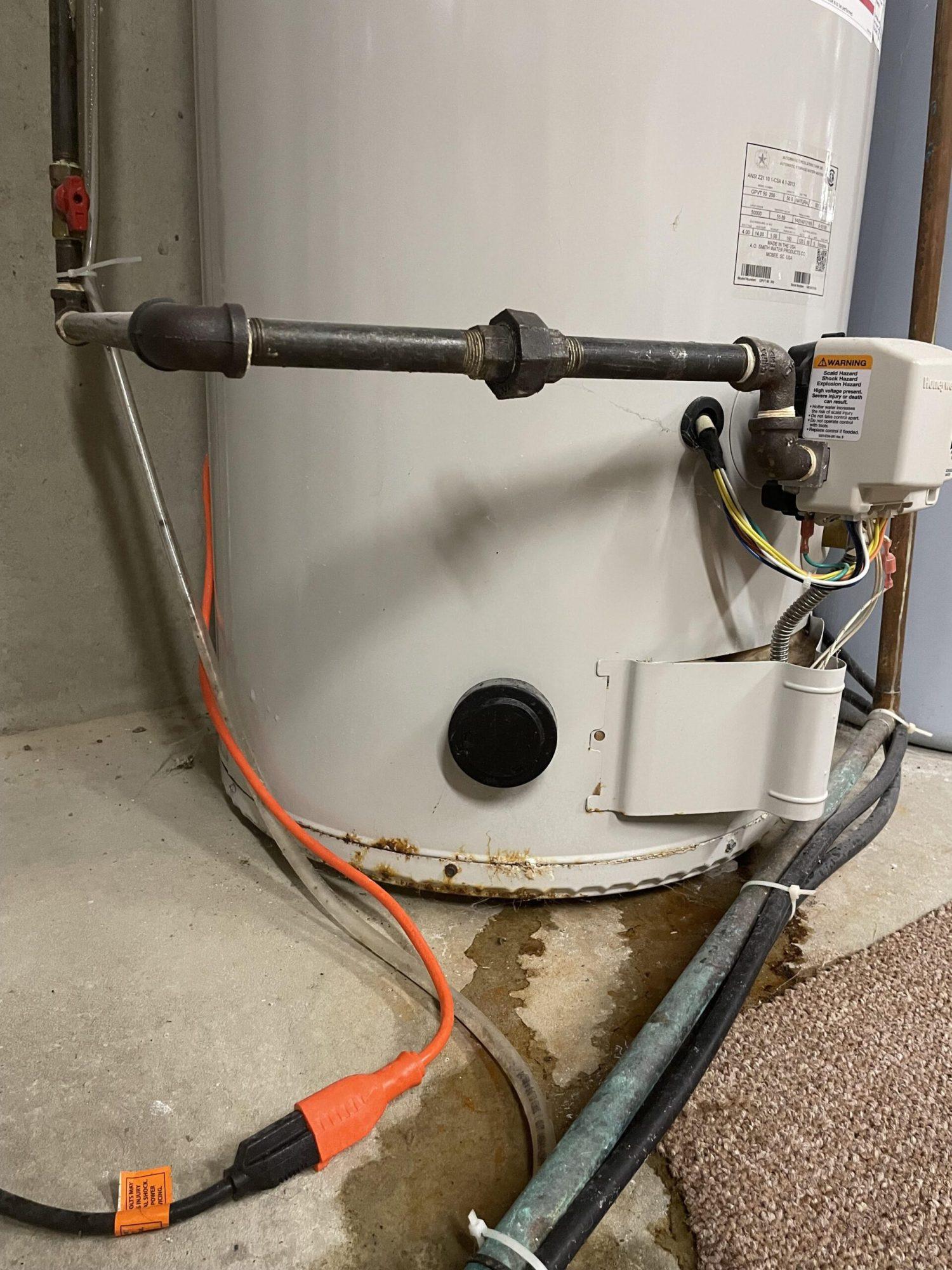
Prevention is always better than a cure. Particularly so when statistics suggest that approximately 69% of all water heater failures result from a slow leak or sudden burst.
Being proactive in the maintenance and upkeep of your hot water system is crucial. This includes keeping an eye on your basement for any signs of moisture or leaks as well as regularly checking your temperature pressure relief valve, a necessary safety device in every heater.
- Insulate your pipes and tank to avoid harmful condensation which could lead to corrosion.
- Have your tank flushed at least every six months by professionals like Dan’s Plumbing.
A Quick Wrap-up
In conclusion, remember that dealing with top heater leaks should be approached with knowledge, patience and prompt action. Weigh the costs and benefits of repair versus replacement. Regular maintenance can help prevent issues and rectify them before they grow into larger complications. Recognise the signs of plumbing emergencies early on to avoid additional costs. And finally, take preventative measures to proactively avoid heater leaks. Over time, you’ll find these tips will save you stress and lighten your wallet less significantly.
Frequently Asked Questions (FAQ)
1. How can I tell if my water heater is leaking?
A puddle of water around the heater, inconsistent water temperature, unusual sounds, or rust-coloured water coming out of taps are signs that your water heater might be leaking.
2. What’s the first thing I should do when my water heater is leaking?
Switch off the power source to your heater and halt the cold water supply. Do not forget to take necessary safety precautions when dealing with electrical appliances.
3. Where can leaks commonly occur in a water heater?
Leaks in a water heater often occur at the pressure relief valve and the drain valve. They can also be due to a corroded tank.
4. How to prevent future water heater leaks?
Timely professional check-ups, tank flushes at least once a year, and replacing the anode rod every 4-5 years can help prevent future water heater leaks.
5. Can I fix a leaking water heater by myself?
Minor leaks at the drain valve or loose connections can often be fixed at home. However, it’s safer and highly recommended to call a plumber to handle major issues or when dealing with electricity.
6. When should I replace my water heater?
If your water heater is 10-15 years old and has major issues, consider replacing it instead of repairing. Upgrading to a more efficient model, like a tankless water heater could also be beneficial.
7. What are some signs of a plumbing emergency?
Uncontrolled leaks, streams of rusty water, and inconsistent temperature could be signs of a plumbing emergency and need to be addressed right away.
8. What is the average lifespan of a water heater?
The average lifespan of a tank water heater is approximately 10-15 years, while tankless models can last up to 20 years with proper maintenance.
9. Can proper maintenance extend the lifespan of my water heater?
Yes, a well-maintained water heater can outlast its average lifespan. Regular draining, checking safety valve, and replacing some parts when necessary can help maintain your heater in good condition.
- Can I Get a Plumber to Help Me Install An Under Sink Water Boiler in Our Office Kitchen? - September 14, 2024
- Can a Plumber Help Me Clear a Badly Clogged Toilet? - September 4, 2024
- Can a Plumber Help Me to Replace a Bathtub Drain Stopper? - August 29, 2024
Related posts:
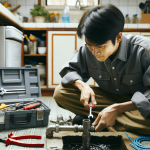 Can a Plumber Fix My Leaking Pipe?
Can a Plumber Fix My Leaking Pipe?
 How Do I Know If I Have a Water Heater Leak? Can Plumbers Do a Test?
How Do I Know If I Have a Water Heater Leak? Can Plumbers Do a Test?
 How to Know When You Need to Get a Plumber to Replace a Shower Cartridge? And How Do These Work?
How to Know When You Need to Get a Plumber to Replace a Shower Cartridge? And How Do These Work?
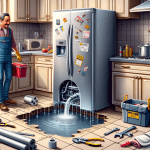 What Should I Do If My Refrigerator Water Line Is Leaking?
What Should I Do If My Refrigerator Water Line Is Leaking?
 Can a Plumber Help Me Fix a Leaking Tap Handle?
Can a Plumber Help Me Fix a Leaking Tap Handle?
 Can Your Plumbers Help Me Fix a Leaking Shower Diverter?
Can Your Plumbers Help Me Fix a Leaking Shower Diverter?

